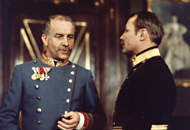materialism & death
The theme that entrenched Hoffmannsthals "Tale" was definately death. From the beginning of the story it told about death. From the merchants son's father and mother's death, to the girl trying to commit suicide, to the servants family almost meeting death. Hoffmannstal's "Tale" shows that he is worried about dying a lonely death. One example would be, why would you keep your servants around all day? The loneliness conveyed gives you a sense of being desperate for some type of interaction with any human being. As Kruas explained, an artist conveys his life in his work but does Hoffmannsthal do that?



3 comments:
I think that focusing on a loneliness death pinpoints the theme even more than just saying death. I too agree that it is not worth living a life for material things. Not only does Hoffmannsthal show us this once in the book (giving money to the man with the horses) but also a second time by trying to give the money to a child. I think that the merchants son sees death when he sees the young girl due to the fact that she is poor, just as he sees unhappiness in the man since he is of blue collar society. In both instances he tries to give them money, but both he fails.
I agree that the merchant's son is definitely obsessed with death. Is it possible that maybe he kept his servants around not so much to keep from being lonely, but to ensure that there would be someone who could tell the story of his life? Maybe he is afraid of not only death, but not being remembered.
I agree that there was definately the theme of death throughout the story, but like others have commented, that is not the only theme. You mention materialism, but don't go too much into it, and I think it would have been good to expand upon what Kraus said, because Kraus brings up some really good points. Such as the merchant's son's death came about when he was trying to recoupe material possessions.
Post a Comment